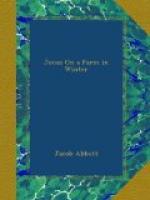“But it seems to me, you’ve grown arbitrary all at once,” said Amos, with a smile.
“Yes,” said Jonas, “I’m always arbitrary when I’m in command; if you mean, by arbitrary, determined to have my own way. I won’t usurp any power; but, if you put it upon me, I shall use it, you may depend upon it.”
Jonas had two good reasons why he wanted to have only one writing-book for all his scholars. One was, that he thought it uncertain how long their school plan would last, and he did not want to trouble the farmer to look up some paper, and then make a parade of preparing so many writing-books; and then, perhaps, the whole plan might be abandoned, when they had written four or five pages in each. And, therefore, as he found one old writing-book of Oliver’s, half full, he determined to make the blank leaves of that answer for all.
But he had another reason still. He thought that, if all his scholars should write, in succession, in the same book, their writing would come into such close juxtaposition and comparison, that each one would be stimulated to write with greater attention and care; as each one would wish his or her own page to look as neatly written as the rest. He knew that Isabella, when it came to her turn to write, would naturally, without any thing being said, look at Amos’s work on the page before, and that she would observe its excellences and its faults, and that her page would probably be written better, in consequence of her criticism upon his.
Thus, though Jonas had good reasons, he chose not to give them. He preferred, if he was going to be teacher, that they should not be in the habit of expecting him to give reasons for all his directions. So he simply expressed his decision upon the subject, by saying,—
“You may do just as you please about making me teacher; but, if you put me into the office, you must expect to have to obey.”
“That’s right, Jonas,” said the farmer’s wife: “I am glad to see you make ’em mind.”
It was settled, without any further discussion, that Jonas’s plan in regard to the writing should be adopted, and that his scholars would obey his directions in other things, whatever they might be. Jonas then proceeded as follows:—
“Now, you see that, if we go on so three evenings, you will all have got three lessons, and the fourth evening we will have for recitation. I will hear you spell, and examine your writing, and see if your sums are done right.”
Jonas’s exposition of the plan of his school was here interrupted by the farmer’s wife, who, as she sat at the end of the settle towards the fire, had her face somewhat turned towards the window, and she saw a light at a distance near the horizon.
“What light is that?” said she.
Jonas and all his school rose, and went to the window to see.
The window looked towards the pond. They looked off across a sort of bay, beyond which there was a long point of land,—the one which the boys had had to sail around when they went to mill. Just over this land, and near the extremity of it, a light was to be seen, as if from a fire, beyond and behind the land.




